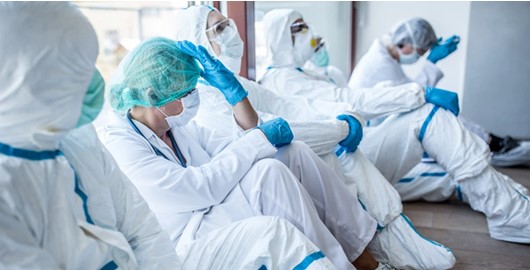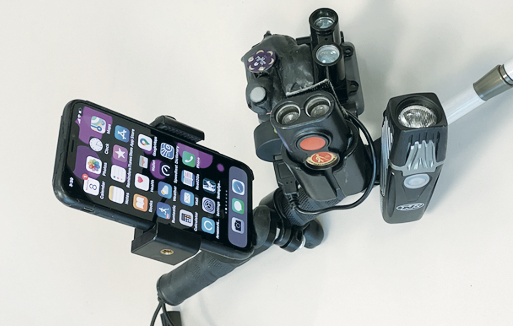Tackling Healthcare Challenges Through Collaborative Innovation

Augmented Reality and 5G
Project Convergence brings “science fiction to life” through its cutting-edge 5G and augmented reality program. NCCHI has created one of the first 5G-enabled hospitals in the world at our home base at VA Palo Alto Healthcare System. This collaboration brings cutting-edge wireless health care solutions, including augmented reality for clinical training, presurgical planning and operative guidance. The partnership includes 5G wireless connectivity from Verizon, clinical augmented reality software from Medivis, and HoloLens 2 headsets from Microsoft.
Fall Prevention Projects
In 2015 the cost of fatal and non-fatal falls in the US was approximately $50 billion – and
since falls disproportionally impact older adults, it is a particularly important issue for
VA to address.
As a result, we have been developing innovative ways to prevent falls and their devastating
consequences. NCCHI is collaborating with the medical company Palarum on an exciting project
that utilizes their smart integrated sock sensor system to alert nurses when a fall-risk
patient attempts to get out of bed. The system is optimized for efficient clinical response
and nurses are empowered to be in the right place, at the right time.


COVID-19 Operational Readiness
During the onset of the COVID-19 pandemic, front-line clinical teams in many parts of the world were overwhelmed, overworked and understaffed. Our NCCHI team proactively sought out advanced tools to optimize VA’s workforce deployment and improve operational agility. Issio is an advanced cloud-based scalable solution that allows us to efficiently float staff to areas where they are most needed. We currently have over 5K employees in the system and areac leveraging the analytics insights to enhance our operational readiness.
XPRIZE Alliance to combat COVID-19
Our NCCHI collaboration with the XPRIZE
Foundation is leading VA innovators to support and resources ninja from around the world to
develop new ways of combatting COVID-19. VA professionals are engaging with fellow global
healthcare leaders to share ideas, present projects, and test solutions to help rapidly
scale promising technology for the global pandemic response. As of December 2020, nearly
three hundred COVID-19 solutions have been shared, 18 new projects initiated, and 6
completions launched through the alliance.
Through this collaboration, we helped to form a Brain Trust around Collective Pandemic
Artificial Intelligence. As part of this effort we joined “AI for Good,” which fosters
solutions and dialogue on the beneficial use of Artificial Intelligence to solve pressing
global issues such as COVID-19, and coordinated support with over 35 sister United Nations
agencies.


AI with DeepMind
In collaboration with Google DeepMind and Google Health, we are studying the clinical
applications of machine-learning. The initial work with VA data demonstrated that a Google
machine learning algorithm can predict acute kidney injury up to two days before normally
detected. This breakthrough offers tremendous potential for early kidney treatment that can
reduce or eliminate the devastating consequences of the disease.
Innovative Treatments for ALS and Prostate Cancer
CCHI has joined the U.S Department of Energy, Lawrence Livermore National Laboratory (LLNL) in the fight against ALS (Amyotrophic Lateral Sclerosis) and prostate cancer, two diseases that have devastating effects on Veteran populations. Our clinical experts, in collaboration with their advanced data scientists, are leveraging LLNL supercomputers to uncover clinical insights from our EHR database that will help us to better understand diagnoses and inform treatments for ALS and prostate cancer.


Augmented Reality Microscope
The Augmented Reality Microscope (ARM) is an advanced Artificial Intelligence and Augmented Reality enabled system which is currently programmed to detect prostate and breast cancer on pathology slides as a clinical decision support tool. Our VA NCCHI, the Defense Innovation Unit, and VA Palo Alto Pathology leadership have been collaborating to optimize the performance of this cutting-edge system to better serve our nation’s Veterans.
Smart Cane for the Blind
Safe and independent navigation is one of the biggest challenges for those who are blind or
visually impaired. Although technological tools are improving, the traditional mobility and
orientation tool (i.e., white cane) utilized by those who are blind or visually impaired has
not significantly changed since its inception nearly 100 years ago – until now.
NCCHI is collaborating closely with Brian Higgins in the development of an advanced sensor
package that attaches to the standard white cane to provide object detection and avoidance
beyond the limited capabilities of the cane itself. The sensor package includes a LIDAR
sensor, two ultrasonic sensors, and is paired with an iPhone and other feedback tools such
as sound and haptics. Brian, a Blind Rehab Specialist at the VA Palo Alto’s Western Blind
Rehab Center, is a visually impaired Veteran himself and has been working for decades to
innovate solutions to this problem.

